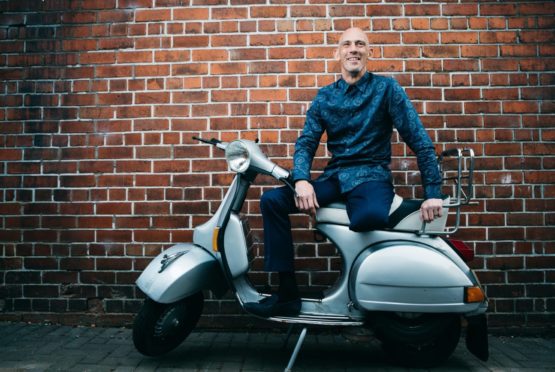
Smiling broadly and looking sharp on his vintage Vespa, Alex Mitchell seems the picture of health.
Just four weeks ago, however, he was in hospital fighting for his life having suffered a highly rare but devastating reaction to the Covid vaccine. After developing blood clots so severe that doctors had no option but to amputate his left leg above the knee, Alex is now recovering at home.
His priority is the battle ahead and ensuring no one is discouraged from getting the vaccine due to his ordeal. Alex, 56, said: “It has been quite a surreal few weeks. I’ve experienced the most horrific days of my life but I’m still here and just need to keep fighting and keep being positive. That’s all I can do.”
He is literally one in a million, or thereabouts, having suffered a side effect of the AstraZeneca jag so rare there is no reliable data on it yet. He said: “This is so rare it isn’t going to happen to many other people so it shouldn’t deter anyone having the vaccine. I had it because I want things to go back to normal as soon as they can. And the only way we can do this is by being vaccinated.”
Alex, from Cambuslang, Glasgow, had his Covid jag on March 20 and, aside from a sore arm and tiredness, seemed fine. But 12 days later, he was struck down with sore calves.The scaffolder said: “The nature of my job is heavy lifting, so we do get aches and pains sometimes. Sore muscles are common. I had a hot bath and an early night. I didn’t think much of it.”
The pain continued over the next few days and on April 4, Alex collapsed at home. “One minute I was doing the ironing and the next my legs buckled,” he said.
With wife Michelle in the kitchen and unable to hear him shouting, Alex dragged himself downstairs and told her to call an ambulance.
“I knew straight away something wasn’t right,” he said. “And when the sweat started pouring off me and I began hyperventilating, I knew I was in trouble.”
Alex was taken to hospital where a CT scan confirmed multiple blood clots in his lower abdomen and in both legs. Rushed into theatre, surgeons removed the clots which thankfully hadn’t moved into his liver and kidneys.
“It was a worrying time,” Alex said. “The doctors were speaking to consultants all around the world about me, because it was unheard of for someone with this level of clotting to survive.”
Alex’s daughters Jennifer, 24, and Sophie, 20, and Michelle waited anxiously for word. During the operation consultants warned them his life was at risk and that amputation needed to be considered, with the loss of both legs a possibility. Alex pulled through but had to come to terms with how his life would change and a week later underwent amputation surgery.
“I asked if they could amputate below the knee, just so that there were more options when it came to getting mobile again,” said Alex. “But unfortunately it had to be above. Every vein in my left leg was collapsing.
“But they saved my life. I should not be here, but I am. It had to happen and I just have to adapt. Thankfully it was just one leg.”
Alex was advised it could take up to a year for him to be fully mobile again, with the help of a prosthetic leg. But he’s determined to prove doctors wrong and do it in three months.
“I was out of hospital last week, just a few days after the surgery, and I’m already determined to get better as soon as I can,” he said. “My attitude is – bring it on! I always try to be the best person I can be, and see the positive, so I’ve already decided losing a leg won’t define me. It will alter my path but I have so much determination and fighting spirit that it won’t stop me being Alex Mitchell.”
Alex faces up to six weeks in a wheelchair to build up his strength before being fitted with a prosthetic leg and then intense rehabilitation to learn to walk with it.
By late summer, the lifelong Mod hopes to be out on his “new” 50-year-old Vespa, suited and booted, doing a charity run to Hairmyres Hospital, to raise funds for Finding Your Feet to enable the charity to buy a new training leg.
“It has given me a whole different perspective,” Alex said. “It has changed my life. I’ve lost my leg and my livelihood. I won’t be able to do scaffolding again and there will be challenges ahead but I believe it will change things in a positive way.Before all this happened I loved nothing more than dancing to Northern Soul. I’m a terrible dancer so it’s no great loss – but I will dance again.
“I wouldn’t want to discourage people from having the Covid jab. From what they know, what happened to me is rare. It’s only going to affect maybe one or two people, so don’t let it put you off.
“It’s a big thing, but the fact that I’m here is an even bigger thing. I’m not going to feel sad or angry. Life four weeks ago was normal and very different, but now I have a ‘new normal’. I’m fully aware that I will have down days – but I had down days when I had two legs.
“I consider myself very lucky. I have family and friends, support and love – and a whole lot of determination. It’s important to be thankful for what you’ve got – and to remember there is always someone worse off than you.”
The rarest risk
Expert: Chance of blood clot from the jag is tiny
The chance of dying from a blood clot after having the AstraZeneca jab is about one in a million.
Among more than 20 million people who have received the AstraZeneca vaccination in the UK so far, just 79 cases of blood clots have been reported, as well as 19 deaths, said the UK’s Medicines and Healthcare Products Regulatory Agency.
This equates to around one case per 250,000 people vaccinated – 0.0004% – and one death in a million.
About 100, 000 people in Europe per month develop blood clots, and 3,000 cases a month are thought to occur in the UK. A recent article in the British Medical Journal stated that to put the risk into context, one in 2,000 women a year will develop a blood clot from taking the combined oral contraceptive pill.
And every year one in 1,000 people will develop a blood clot from air travel.
Linda Bauld, professor of public health at the University of Edinburgh, said there was a much higher risk of death from the coronavirus than from the vaccine.
“Blood clots are very common, up to 20% of cancer patients will develop them but the risk of them from the AstraZeneca vaccine is tiny,” she said.
“The benefits of the vaccine still outweigh the risks. The risk of dying from Covid in the
over-50s is one in 1,000 which is a very high risk, much more than the risk of death from the vaccine.”
Bauld added: “Even the flu vaccine can have very rare side effects, like
Guillain-Barre syndrome, which can cause paralysis. It’s important to remember that with any medications, there
are risks.”

Enjoy the convenience of having The Sunday Post delivered as a digital ePaper straight to your smartphone, tablet or computer.
Subscribe for only £5.49 a month and enjoy all the benefits of the printed paper as a digital replica.
Subscribe
